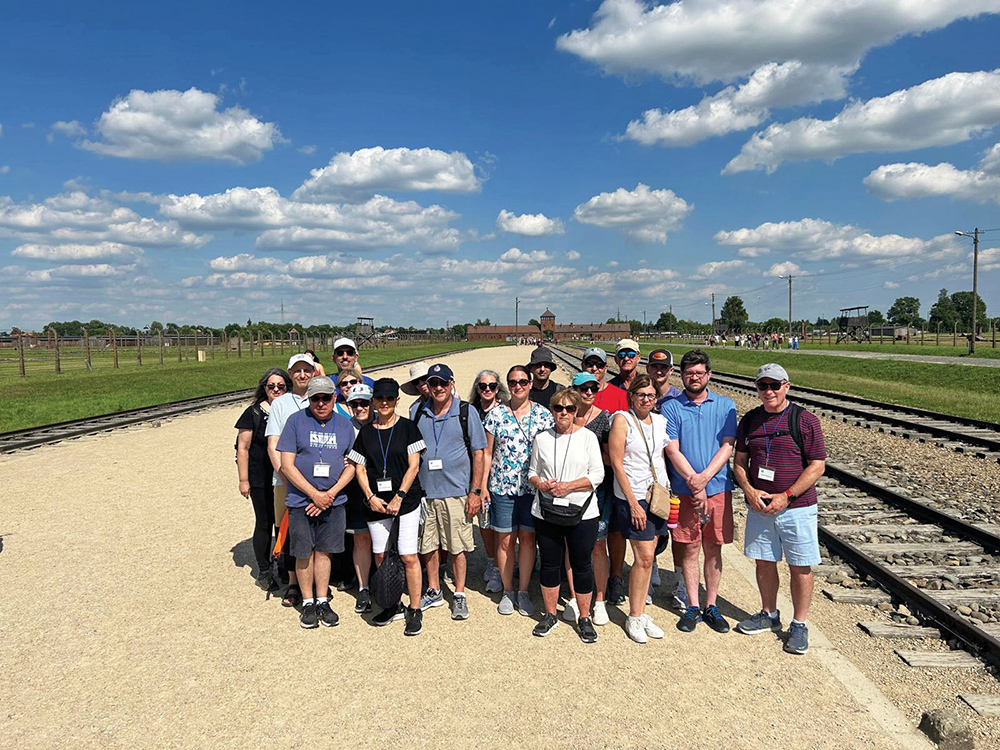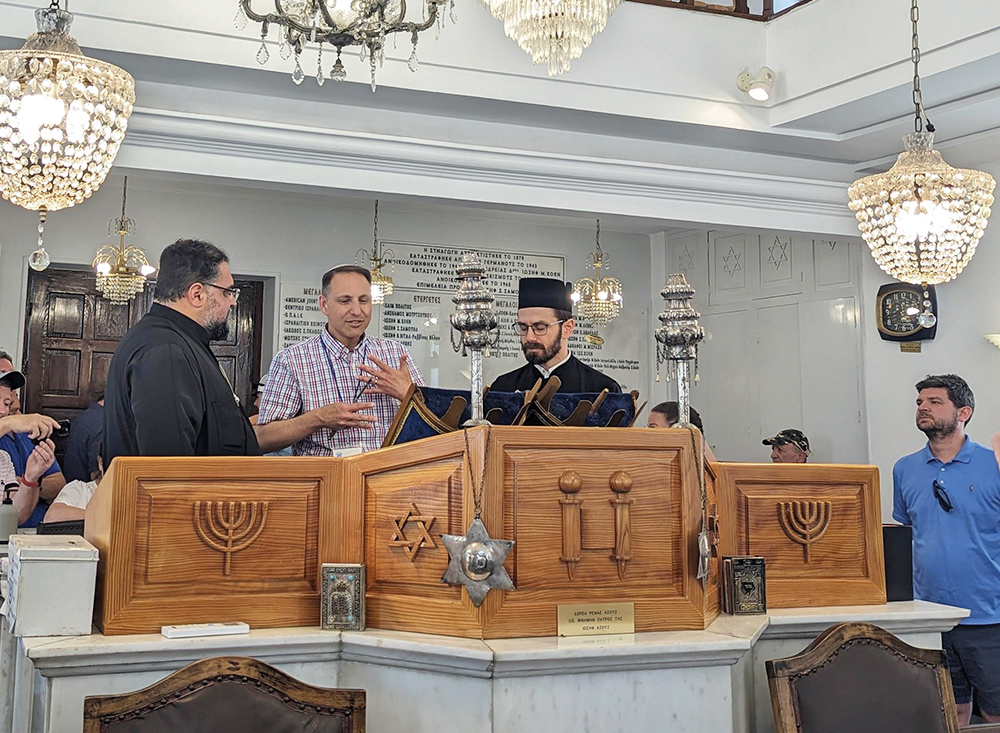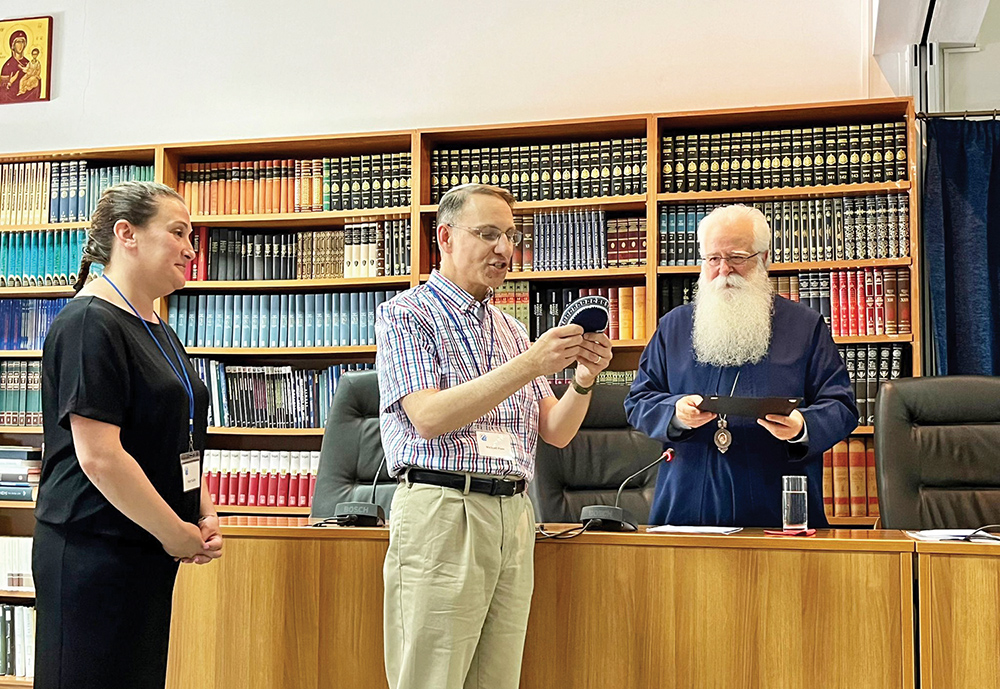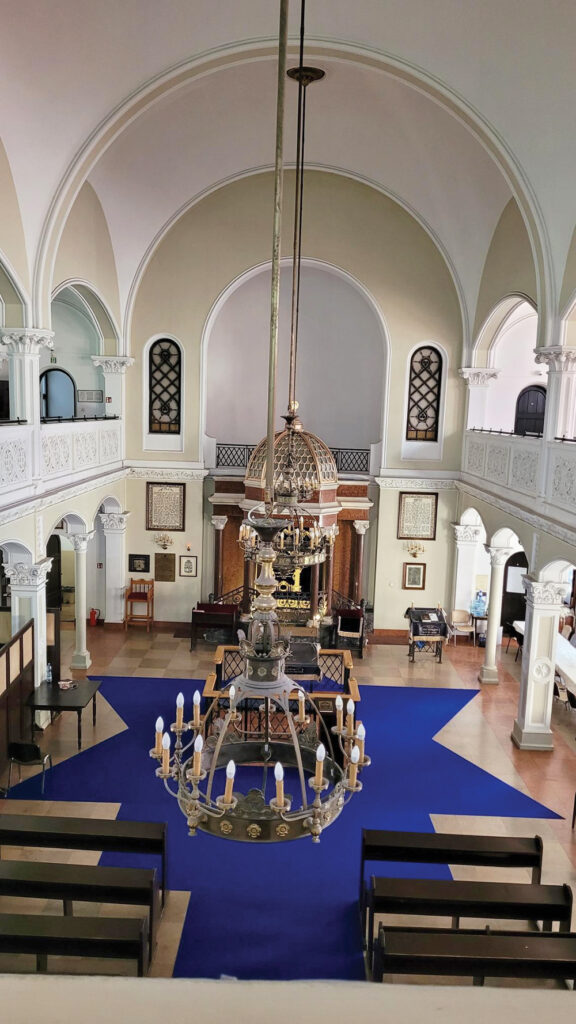
A mission to memorialize the victims of the Holocaust that started with the almost obligatory trip to Polish concentration camps ended at a place not often associated with the Holocaust.
For 21 congregants at the Marlboro Jewish Center (MJC) in Monmouth County, going on to Greece for a mission undertaken with the Ferencz Institute for Ethics, Human Rights and the Holocaust was surprisingly uplifting.
While those on the 10-day July trip saw a nascent revival of Jewish life with functioning synagogues and a Jewish community center in Poland, the feel was decidedly different in Greece. There the group learned firsthand about current Greek efforts to support the revival of Greek Jewry and the role of the Greek Orthodox Church to save Jews during the Holocaust, which provided a welcome contrast to the Auschwitz, Birkenau and Majdanek camps.
Stacy Gallin, the founding director of the Ferencz Institute and an MJC member, said she had led trips to Holocaust sites with both Jews and non-Jews, but particularly wanted to lead a mission with her synagogue.
“When you take this trip with Jews they feel a real connection to these camps,” Gallin said. “They knew of people who died there. When you do it with a synagogue it makes you feel the strength of community. By the same token it shows that we’re still here.”

That solidarity was demonstrated by having Shabbat dinner at the Krakow JCC and touring the Jewish quarter.
“I have a lot of collaboration with the Greek Orthodox Church, and the idea here was really to transcend boundaries and reach across interfaith boundaries,” said Gallin, adding that it reinforces the idea that the Holocaust was also a human story. “We need allies, and I have found the Greek Orthodox Church to be a strong ally.”
Greece, like Poland, lost much of its Jewish population to the Nazis. Prior to the Holocaust, about 77,000 Jews lived in Greece, about 50,000 of them in Salonika, according to Yad Vashem.
“We saw death and destruction but also attempts to revive Jewish life in Poland,” said Gallin. “We know there is rampant antisemitism in the world, and we know it’s rising. We know for the next generation it’s better in Europe to have access to Jewish life. In terms of education, that is why we take people to these sites.”

Rabbi Michael Pont said part of the synagogue’s new partnership with Ferencz is focused on “taking the lessons of the Holocaust and applying them to today to create the leaders of tomorrow.”
While going to Auschwitz was an important component of learning the lessons of the past, it was in Greece, particularly in the town of Volos, that Rabbi Pont and others found inspiration and hope for the future. There they learned how the community rallied to save 70% of its Jews, and they met with a bishop and other Greek Orthodox leaders. They also visited its small synagogue, which doesn’t have a rabbi, but where Rabbi Pont read Torah and answered questions.
“There we realized we aren’t alone in the face of the very real rise of antisemitism in the United States and worldwide,” said Rabbi Pont. “It was so inspiring and really a breath of fresh air to see there are devout Christians who are absolutely appalled and not afraid to say antisemitism is wrong and an anathema to what it means to be a human being. The bishop there and the community actively defied the Nazis to support their fellow citizens. That wasn’t the case in all of Greece, but it was in this town, and it is still the spirit today.”
For synagogue president Mark Eiger, who went with his wife, Rhonda—a past synagogue president—the trip had its surprises. Having been to Yad Vashem and the United States Holocaust Memorial Museum, he had steeled himself for the camps, but instead they seemed to be another museum, albeit a horrific one.
“What really brought home the devastation was the synagogue in Krakow,” Eiger said. “The acoustics were magnificent, but in a sense there was a void that can never be filled. In Majdanek it really hit me—the tremendous devastation.”
Eiger said he also felt a distinct difference in the way Poles and Greeks viewed Jews and their own role during the Holocaust.
“I felt the people [in Poland] treat us like kids in school learning about dinosaurs,” he said. “My impression in Greece was very different. In Greece they spoke about it [the Holocaust] in the first person. They were the most hospitable people I’ve ever met. There was definitely more awareness and more personal awareness than what we saw in Poland. In Poland they said, ‘The Nazis invaded us from the west and Soviets from the east.’ We heard a lot about Polish victims, not so much about Jewish victims.”

Additionally, Eiger said that during their meeting with the bishop they learned that the church was today supporting 60 Jewish families.
MJC Executive Director Dara Winston is the granddaughter of Auschwitz survivors, and her Israeli-born husband, Meir, is Sephardic, so the trip was especially meaningful to them. She agreed there was “definitely a different feeling” in Greece as compared to the lack of accountability in Poland.
“They [Poles] have this sense that ‘we were also victims and everyone got along before the Holocaust; the Nazis made us do it,’” said Winston. “In Greece we found there was remorse. The Greeks gave reparations and we got the sense they took some responsibility.”
Sandor and Elyce Epstein had some different experiences than the rest of the mission participants. Not only did they go on to Israel, where their daughter lives, on a day off in Poland while the rest of the group toured the salt mines, they instead went to Warsaw to visit the Nozyk Synagogue, built by her great-great grandfather Zalman Nozyk. It survived the Holocaust and still functions as a synagogue with a daily minyan and a Friday night Shabbat dinner.
“Once they realized Elyce was a descendant, it was like she was a superstar,” said Sandor Epstein, adding that Nozyk, whom he described as owning “the Walmart of Warsaw,” had only two requests—that the synagogue retain its name and that the congregation say Kaddish on his and his wife Rivka’s yahrzeits. Nozyk also built a town square that was destroyed by the Nazis.
Inside the Epsteins saw plaques dedicated to her ancestors, and Elyce said she could imagine her great-grandmother Rivka Nozyk, whom she knew as a child, running around the building.
Debra Rubin has had a long career in journalism writing for secular weekly and daily newspapers and Jewish publications. She most recently served as Middlesex/Monmouth bureau chief for the New Jersey Jewish News. She also worked with the media at several nonprofits, including serving as assistant public relations director of HIAS and assistant director of media relations at Yeshiva University.









